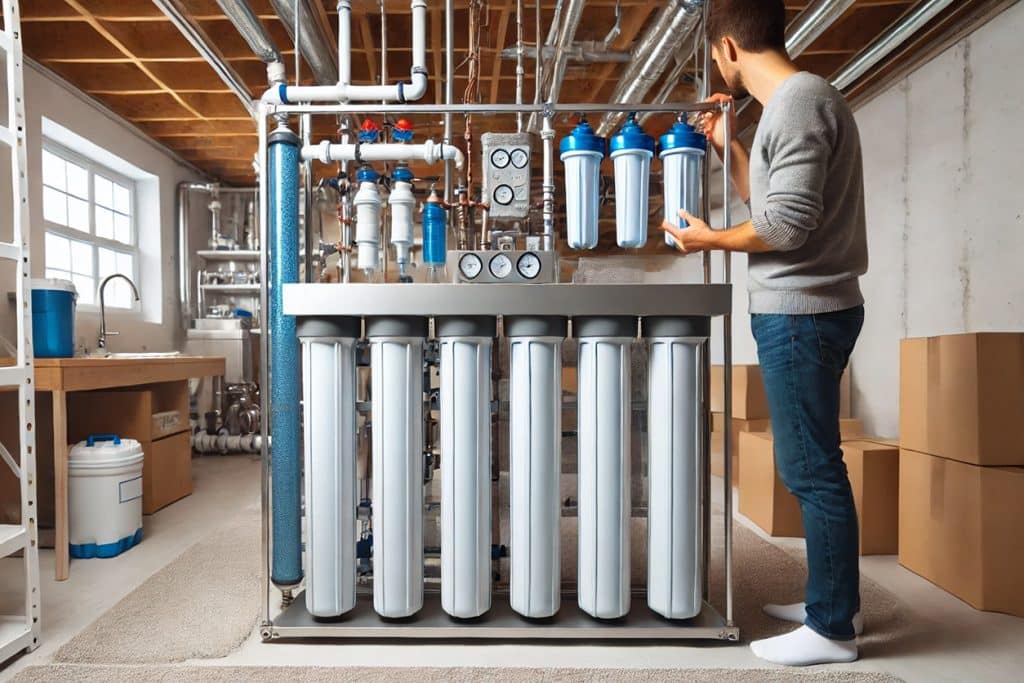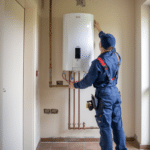
According to a survey done by Aquasana, 77% filter their home’s drinking water.
This is very important as water can carry all kinds of contaminants, from sediments to waterborne bacteria.
The best way to make sure that your home’s water supply is safe for you and your family to use is to install a whole house filtration system. These filtration systems are designed to clean up your home’s entire water supply, ensuring that every faucet and shower in your home will have clean water.
Let’s explore how you can get the best use out of a whole house filtration system.
How can I get the maximum from a whole house filtration system?
Here are a few things to consider if you want to get the best out of your system:
1. Check the Water Quality
If you haven’t installed a water filtration system yet, you first need to check your water quality.
Take note of the types of contaminants present in the water—this information will be vital for choosing the right water filter since different types of water filters specialize in filtering out different kinds of contaminants.
For example, some filters are capable of removing sediments from the water while others can remove Volatile Organic Compounds (VOCs) too.
You could try testing the water quality yourself by using a water testing kit, but it would be a better idea to ask a professional plumber to help you with this. They have the right equipment for the job, and they can recommend the ideal water filter based on the contaminants in the water.
2. Think About Your Home’s Size and Usage
Ideally, the whole house water filtration system’s capacity and your home’s water usage should match.
If your home is on the large side, you’ll need a filtration system with a higher flow rate to avoid pressure drops. Note that filtration systems that have a higher flow rate will require more frequent filter changes.
3. Call a Professional Plumber
Installing a whole home filtration system is very difficult to do yourself. In addition, if the installation isn’t done the right way, the filtration system won’t work as intended, leading to problems like pressure drops.
Also, an improperly installed filtration system may get damaged over time, and this could lead to expensive repairs.
Get help from a professional plumbing service for installation. They have experience in installing all kinds of filtration systems and can help you find the right one for your home.
4. Test Regularly
To make sure that your filtration system performance is consistent, you should test the water at least once a month. A simple test that you can perform is to put the water into a clean glass and then look for any clear signs of sediment.
Keep in mind that there are still many contaminants that are invisible to the naked eye, so the glass test won’t always be effective. For a more thorough test, you should consider calling a professional plumbing company.
How do I know if there’s something wrong with my filtration system?
Here are some telltale signs that you might need to check on your whole house filtration system:
1. Drops in Water Pressure
This is a common sign that something isn’t right with your water filtration system. In most cases, this may happen due to the presence of a block somewhere in the pipes, or your system’s filters are clogged with dirt and debris and need cleaning.
2. Unpleasant Taste
If your home’s drinking water is starting to taste funny, it may be a sign that the filtration system isn’t doing its job right. In this case, the carbon filter may be clogged up and in need of replacement.
3. Frequent Filter Replacements
While filters need to be replaced regularly, they should have a reasonable lifespan. Sediment filters should last about 3-6 months before they need to be replaced and submicron filters should ideally last 9-12 months.
If you need to replace these filters a lot earlier or more frequently than what the manufacturer recommended, there may be a problem with the filter.
4. Leak and Water Damage
If you start to notice water leaks near the area where you’ve installed your water filtration system, it may be a sign of a plumbing issue. Usually, this might have happened due to poor installation.
Also, leaks and water damage should be fixed as soon as you notice them. Left unchecked, water damage can lead to mold growth and even structural damage.
What are some mistakes you should avoid?
The following are a few common mistakes you need to avoid when you choosing a filtration system for your home:
1. Not Understanding Your Filtration System
Not all water filtration systems are the same, so it’s very important to understand how your system works. Some systems have a tank where water is stored before being pumped into your home, while others are gravity-fed.
This way, you can identify issues with your filtration system and call a professional for help before it’s too late.
2. Not Researching Different Brands
Sticking to a brand you’re familiar with when looking for water filters isn’t always a good idea. Sometimes, the brand you like may not have a water filtration system that’s right for your home.
Research different well-known brands to find a system that is right for you, or ask a plumbing service to help you out.
3. Not Keeping Up with Maintenance
Water filtration systems are big investments; for instance, whole home water filtration systems that use reverse osmosis can cost up to $8,000. With this in mind, you should get your water filtration system checked at least once a year.
Failure to do regular maintenance could lead to your filtration system deteriorating quickly, and you may end up paying for hefty repairs and, in the worst-case scenario, a replacement.
Frequently Asked Questions
Below are some commonly asked questions and answers about whole house filtration systems:
1. How long does a water filtration system normally last?
A typical water filtration system can last up to 10 years, given that the system is regularly maintained.
2. Can these filtration systems remove sulfur and iron from water?
Yes, some filtration systems can effectively remove sulfur and iron from water.
3. What is a micron rating for a water filter?
The micron rating tells you the size of the particles that can be removed from the water. The smaller the rating, the smaller particles that the filter can remove.
Discover the perfect whole house filtration system
A good filtration system is vital for any home. Finding the right filtration system can be a challenge but that is why professional plumbers exist.
With the help of Voyager Plumbing, you can find the ideal water filtration system for your home and ensure clean water for you and your family. Contact us today!







